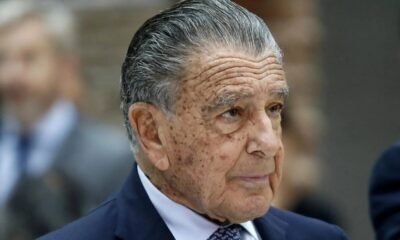INTERNACIONAL
Trump admin cracks down antisemitism as DOJ official exposes ‘violent rhetoric’ of radical protesters
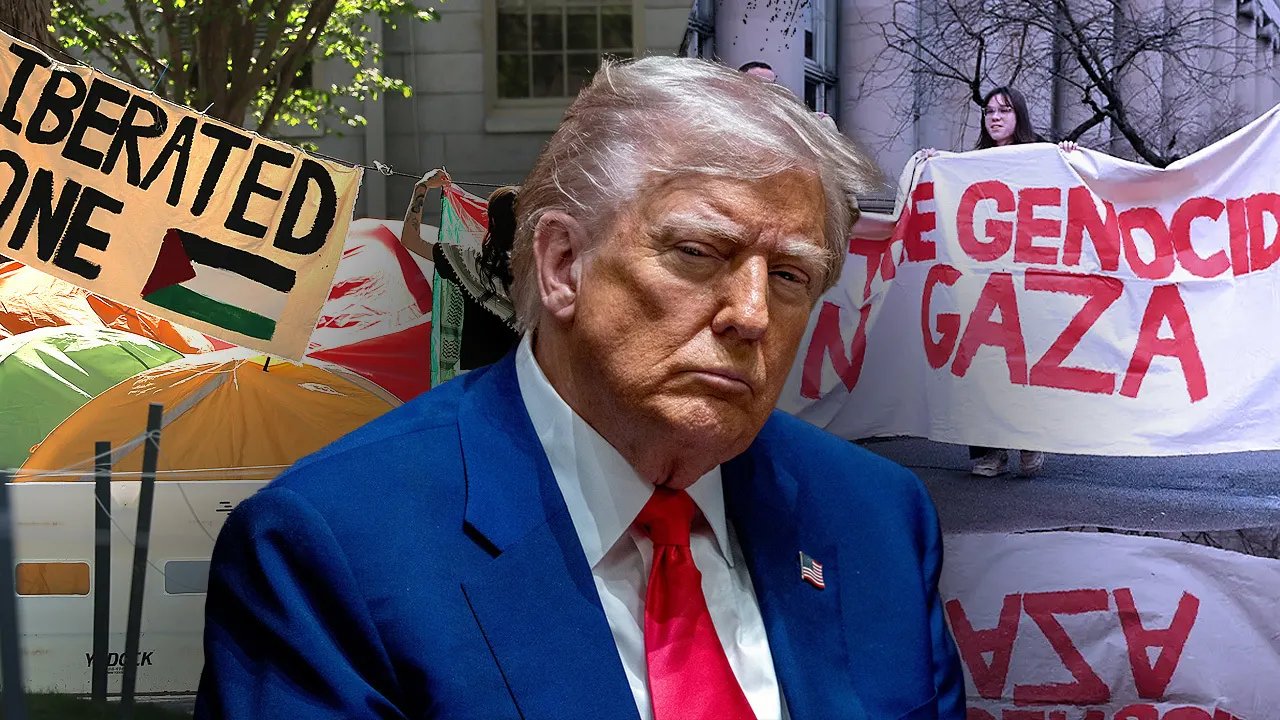
NEWYou can now listen to Fox News articles!
The Trump administration has taken a more aggressive approach than its predecessor toward addressing the nationwide surge in antisemitic incidents, launching investigations, punishing elite universities, and intensifying its immigration enforcement practices.
President Donald Trump, through his Department of Justice (DOJ) and other agencies, is using law-and-order tactics that his deputies say are necessary, but that critics say could constitute overreach.
Harmeet Dhillon, the DOJ’s assistant attorney general for the Civil Rights Division, told Fox News Digital she has not seen any «close cases» when it comes to weighing antisemitic behavior against First Amendment rights of those who oppose Israel or Judaism.
BIDEN EDUCATION DEPT PUT PRIORITY ON PRONOUNS, LEFT BACKLOG OF NEARLY 200 ANTISEMITISM COMPLAINTS: OFFICIAL
«Criticizing the government of Israel is not what I’m typically seeing here,» Dhillon said. «I’m seeing an intifada revolution. I’m seeing blocking Jewish students from crossing campuses and destroying property on campus, which is a crime. … Quiet, polite conversation and disagreement with Israeli policy is not really what’s happening here. It’s literally people saying Israel shouldn’t exist — and bringing the revolution to the United States.»
Dhillon added that «that type of violent rhetoric has led to violent acts in our country.»
Antisemitic violence
After Hamas’s deadly terrorist attack on Israel on Oct. 7, 2023, the FBI’s hate crime statistics showed a sharp spike in anti-Jewish incidents in the U.S. The data runs through December 2023.
Anti-Defamation League (ADL) data from 2024 and high-profile incidents this year suggest the trend is continuing.
Police respond to a firebombing in Boulder, Colo., last week, where a suspect identified as Mohamed Sabry Soliman, right, was arrested and charged by state and federal authorities. (Storyful/KDVR)
An Egyptian national in the U.S. illegally in Boulder, Colorado, is facing state and federal charges for allegedly injuring 15 people, including elderly victims and a dog last weekend with Molotov cocktails during a peaceful pro-Israel demonstration in support of hostages being held by Hamas terrorists in Gaza.
Suspect Mohamed Sabry Soliman, 45, stated to authorities «he wanted to kill all Zionist people and wished they were all dead,» according to an FBI affidavit. During the attack he allegedly yelled «free Palestine,» the agent said.
In May, Yaron Lischinsky and Sarah Milgrim, who worked at the Israeli Embassy in Washington, D.C., were gunned down outside the Capitol Jewish Museum in D.C.
Suspect Elias Rodriguez of Illinois shouted «free Palestine» as he was detained, and Interim U.S. Attorney for D.C. Jeanine Pirro said her office is investigating the case as a hate crime and act of terrorism.

Mohamed Sabry Soliman, left, and Elias Rodriguez allegedly committed crimes, including murder, and shouted, «Free Palestine» afterward. (Alex Osante / Instagram/@shinewithIsrael)
SUSPECT CHARGED WITH MURDERING ISRAELI EMBASSY STAFF COULD FACE DEATH PENALTY
In another incident, a man allegedly set fire to Pennsylvania Gov. Josh Shapiro’s residence on the first night of Passover. Emergency call logs released by local authorities revealed that the suspect, Cody Balmer, invoked Palestine after the arson and blamed Shapiro, who is Jewish, for «having my friends killed.»
Tarek Bazrouk, who identified himself as a «Jew hater» and said Jewish people were «worthless,» allegedly carried out a series of assaults on Jewish New Yorkers in 2024 and 2025, according to an indictment brought against him in May.
Bazrouk wore a green headband that mimicked Hamas garb and a keffiyeh during the attacks, and he celebrated Hamas and Hizballah on his social media, according to federal authorities.
Harvard and Columbia
Trump warned in an executive order at the start of his presidency that foreign nationals participating in «pro-jihadist protests» would be deported, and he specifically highlighted college campuses as being «infested with radicalism.»
Unlike the Biden administration, the Trump administration has since gone to war with elite universities, some of which have been roiled by disruptive pro-Palestinian protests that involve occupying academic buildings and installing encampments.
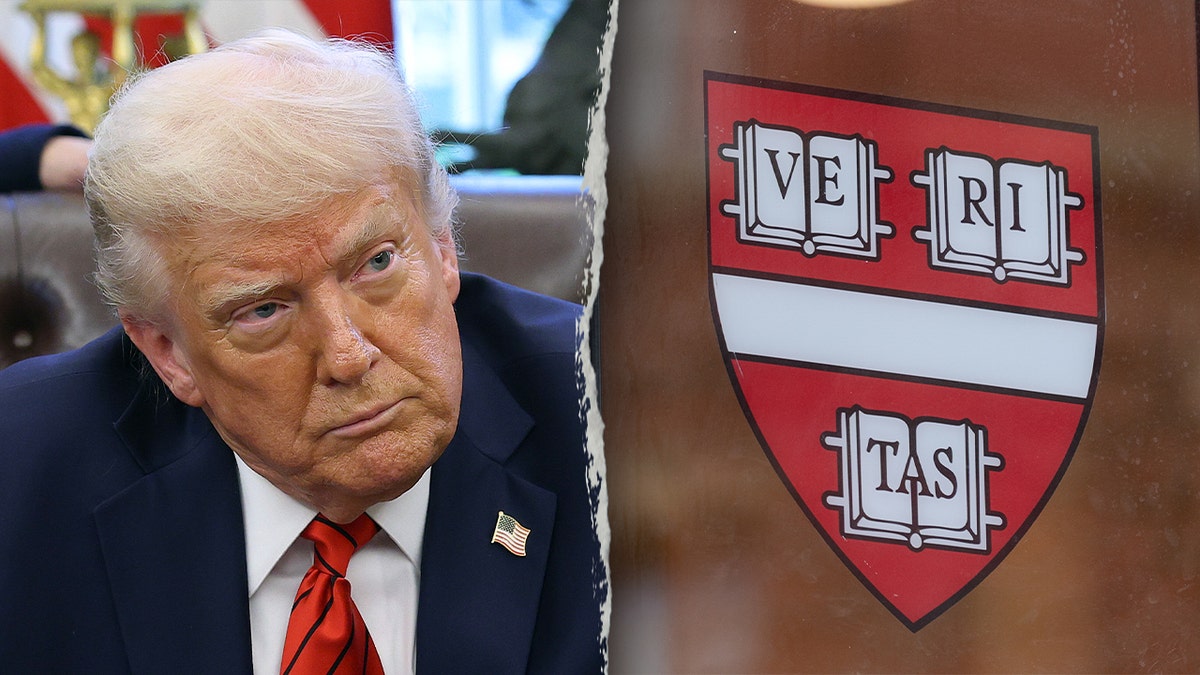
The Trump administration has taken on elite universities such as Harvard.
LEO TERRELL SAYS TRUMP ADMIN WILLING TO TAKE HARVARD ANTISEMITISM FIGHT ALL THE WAY TO SUPREME COURT
Harvard and Columbia, in particular, are now engaged in litigation after Trump moved to freeze billions of dollars in federal funding for the universities and ban Harvard’s foreign students.
The embattled schools have been successful in winning temporary pauses to Trump’s sanctions through the courts, but litigation is pending and legal experts have said they face an uphill battle.
Free speech controversies
The Trump administration has zeroed in on non-citizen students and activists who it has accused of supporting Palestinian causes in ways it deems hostile to U.S. interests.
Amid Trump’s pursuit of visa and green card holders, Mahmoud Khalil’s case has become a flashpoint.
Khalil was arrested in March and detained after the administration accused him of violating immigration laws by engaging in anti-Israel activism.
This week, Khalil said in court papers the administration’s claims against him were «grotesque» and that his activism involved «protesting this Israeli government’s indiscriminate killing of thousands of innocent Palestinians.»
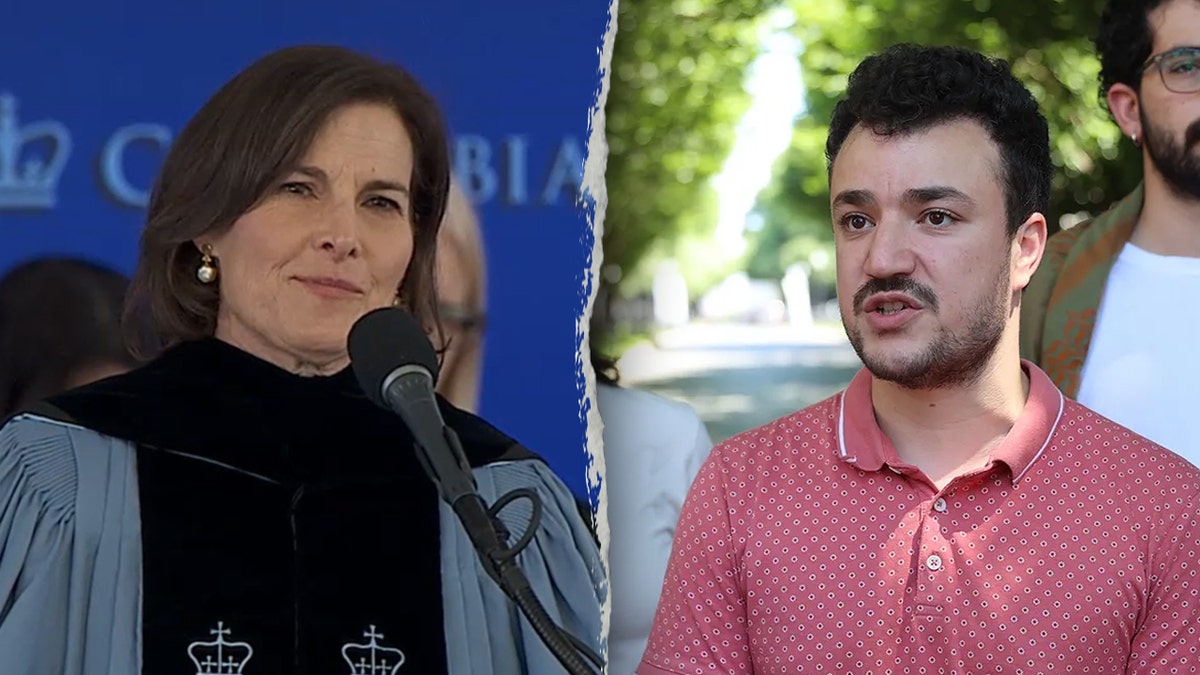
Acting Columbia University President Claire Shipman was interrupted by students during graduation, who chanted, «Free Mahmoud,» calling for Mahmoud Khalil, right, to be freed. (Columbia University / Selcuk Acar/Anadolu via Getty Images)
Civil rights groups have warned that the government’s hardliner posture risks violating free speech and protest rights. A coalition of 60 groups issued a joint statement this week on antisemitic hate crimes in which it warned the Trump administration not to over-correct because it would «make us all less safe.»
«As we condemn these heinous [antisemitic] acts and those who perpetrate hate and violence, we also recommit to ensuring that these events — and the legitimate fear in the Jewish community — are not exploited to justify inhumane immigration policies or to target Arab Americans and those who peacefully and nonviolently exercise their First Amendment rights in support of Palestinian human rights,» the groups said.
Dhillon told Fox News Digital: «It’s not my responsibility to balance free speech issues on campus. It’s my responsibility to enforce the federal civil rights laws. And my opinion, there’s really no conflict.»
Antisemitic task force and more
When he took office, Trump vowed in a string of executive orders to direct Attorney General Pam Bondi to «aggressively prosecute terroristic threats, arson, vandalism and violence against American Jews.»
Trump appointees at the DOJ then moved quickly to convene an antisemitism task force. Dhillon said there is also frequent communication between the White House, the DOJ, and Jewish leaders about addressing antisemitism.
JEWISH STUDENTS WELCOME TRUMP ADMIN’S CRACKDOWN ON ANTISEMITISM, HAMAS SYMPATHIZERS ON CAMPUSES
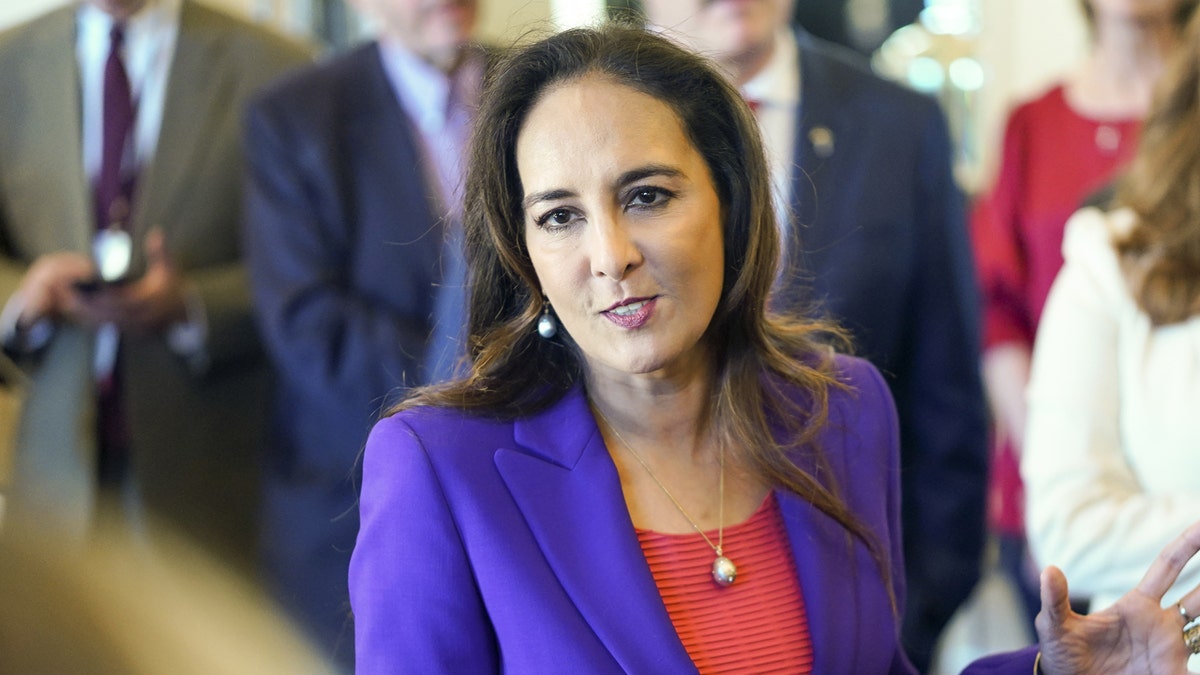
DOJ Assistant Attorney General for the Civil Rights Division Harmeet Dhillon says she’s focused on launching the division’s work toward combating antisemitism. (Kyle Grillot/Bloomberg via Getty Images)
«We have heard from the Jewish community, and I’ve probably met with — I think there’s at least two dozen rabbis who have my number on speed dial now. I literally sent three emails to rabbis in the last hour,» she said.
She said her division has opened several investigations involving land use for religious purposes under a law known as the Religious Land Use and Institutionalized Persons Act (RLUIPA), including five related to Judaism. The administration is also notifying Jewish communities of grants available for added security at synagogues, and she said campuses are a «significant focus» for her.
Internal turmoil
After reports surfaced that Dhillon’s shakeup in the Civil Rights Division led to a mass exodus of more than 100 attorneys leaving the division, she told the media she was unfazed by the departures and that her focus remains on launching the division’s work toward combating antisemitism.
Testing the limits of his subordinates and the courts, another top DOJ official, Emil Bove, launched an internal investigation into Columbia student protesters early this year. The probe caused concern among line attorneys, who felt it was flimsy and was also met with multiple reprimands from a magistrate judge, according to the New York Times.
CLICK HERE TO GET THE FOX NEWS APP
Deputy Attorney General Todd Blanche said in a statement in May that the New York Times’ story was false and fed to the newspaper «by a group of people who allowed antisemitism and support of Hamas terrorists to fester for years.»
Blanche confirmed the veracity of the investigation and said it involved, in part, a probe into a Hamas-linked image on Columbia University Apartheid Divest’s social media.
INTERNACIONAL
Camiones de ayuda humanitaria comenzaron a entrar a Gaza tras el anuncio de una “pausa táctica” de Israel

Los primeros camiones cargados con ayuda humanitaria comenzaron a ingresar a la Franja de Gaza desde Egipto el domingo, coincidiendo con el anuncio israelí de una “pausa táctica” en sus operaciones militares en partes del territorio devastado para permitir las entregas de asistencia.
Los medios estatales egipcios confirmaron el movimiento de convoyes, compartiendo imágenes de camiones en la zona fronteriza. Las imágenes de AFP mostraron grandes camiones cargados con sacos blancos atravesando el lado egipcio del paso de Rafah.
Algunos camiones exhibían el logo de la Media Luna Roja Egipcia, mientras que otros portaban la bandera de Emiratos Árabes Unidos, con letreros que decían: “Emiratos Árabes Unidos – Ayuda Humanitaria para Gaza – Proyectos de Apoyo de Agua en Gaza”.
Sin embargo, los camiones que cruzan la frontera de Rafah no pueden ingresar directamente a Gaza, ya que el lado palestino del cruce fue tomado por el ejército israelí el año pasado y ha resultado gravemente dañado. En su lugar, deben desviarse algunos kilómetros hacia el cercano cruce de Kerem Shalom (Karam Abu Salem), que está controlado por Israel. Allí son inspeccionados antes de ser autorizados a entrar al sur de Gaza.
El ejército israelí anunció el domingo que la pausa diaria en el enclave, que se extenderá de 10:00 a.m. a 8:00 p.m., se aplicará únicamente a áreas específicas, incluyendo Al-Mawasi, Deir el-Balah y partes de la Ciudad de Gaza, donde las tropas israelíes no están operando actualmente.
El comunicado militar agregó que se habían abierto rutas seguras a través del enclave para facilitar los convoyes de las Naciones Unidas y otras organizaciones de ayuda. Estas rutas operarán “de las 06:00 a las 23:00 (03:00 a 20:00 GMT) para permitir el paso con toda seguridad de las caravanas de la ONU y de las organizaciones de ayuda humanitaria que entregan y distribuyen alimentos y medicamentos a la población”.
La medida surge en medio de una creciente presión internacional sobre la crisis de hambre que se agrava en Gaza. Israel comenzó a lanzar alimentos desde el aire hacia el territorio, siguiendo anuncios similares de los Emiratos Árabes Unidos y el Reino Unido.
El ejército israelí difundió imágenes del lanzamiento en paracaídas de “siete lotes de ayuda que contienen harina, azúcar y conservas” sobre el enclave, realizado “en coordinación con organizaciones internacionales y dirigido por el Cogat”, un organismo del Ministerio de Defensa israelí responsable de los asuntos civiles en los Territorios Palestinos.
Sin embargo, los funcionarios humanitarios se mantienen escépticos sobre la efectividad de estas medidas. El jefe de la agencia de la ONU para los refugiados palestinos (UNRWA), Philippe Lazzarini, advirtió que los lanzamientos aéreos eran “costosos, ineficaces y pueden inclusive matar a civiles hambrientos”.
Israel insiste en que no está restringiendo la ayuda y afirma que algunas agencias de la ONU no están distribuyendo los suministros que ya se encuentran dentro de Gaza. Pero las organizaciones de auxilio acusan al ejército de limitar el acceso y crear condiciones peligrosas cerca de los centros de distribución.
La situación humanitaria se ha deteriorado gravemente en los últimos días. Más de 100 organizaciones no gubernamentales advirtieron esta semana que el “hambre masiva” se extiende por la Franja de Gaza, donde viven más de dos millones de personas.
El sábado, la agencia de defensa civil de Gaza informó que más de 50 palestinos murieron en ataques y disparos israelíes, incluyendo algunos que esperaban ayuda.
A finales de mayo, Israel levantó muy parcialmente el bloqueo total impuesto a la Franja en marzo, lo que ha llevado a graves carencias de alimentos, medicamentos y otros bienes de primera necesidad. La ONU y diferentes organizaciones no gubernamentales han denunciado un aumento de la desnutrición infantil.
El viernes, París, Berlín y Londres instaron a Israel a “levantar inmediatamente las restricciones sobre el envío de ayuda”. La ONU realizará este lunes y martes una conferencia de alto nivel en su sede de Nueva York para debatir una solución diplomática.
La guerra en Gaza fue desencadenada por un ataque del grupo terrorista palestino Hamas en Israel el 7 de octubre de 2023, que provocó la muerte de 1.219 personas del lado israelí, en su mayoría civiles. En respuesta, Israel lanzó una ofensiva que ha dejado al menos 59.733 muertos en la Franja, en su mayoría civiles, según datos del Ministerio de Salud de Hamás, considerados fiables por la ONU.
Middle East,Military Conflicts,RAFAH
INTERNACIONAL
From talk to tactics: Trump pivots on Russia strategy to end war
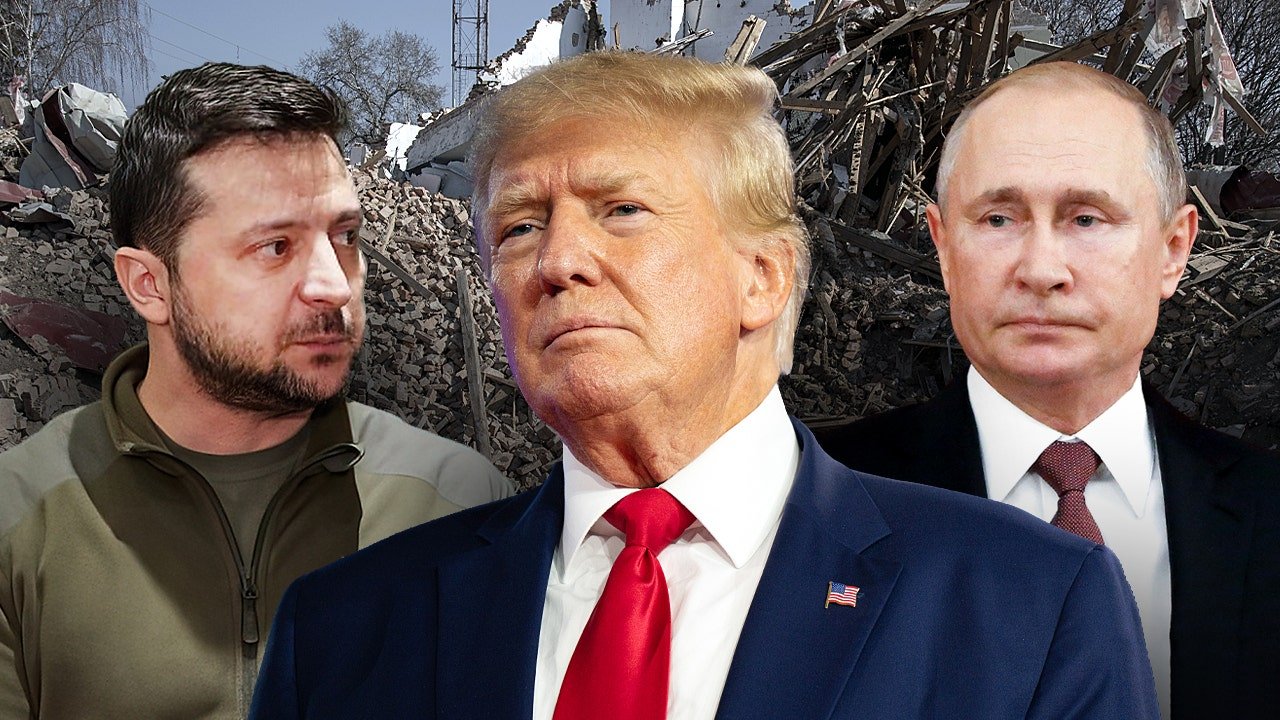
NEWYou can now listen to Fox News articles!
President Donald Trump’s approach with Russian President Vladimir Putin pivoted drastically this month when, for the first time since returning to the White House, he not only confirmed his support for Ukraine in a NATO arms agreement but issued an ultimatum to the Kremlin chief.
The warning came in a clear message: Enter into a peace deal with Ukraine or face stiff international sanctions on its top commodity, oil sales.
While the move has been championed by some, it has been questioned by others who debate whether it will be enough to deter Putin’s war ambitions in Ukraine. One security expert is arguing the plan will work, but it might take years to be effective.
President Trump speaks to Russian President Vladimir Putin during his first term. (Reuters/Jorge Silva)
NATO CHIEF PRAISES TRUMP’S WEAPONS SALES TO ALLIES AS ‘SIGNIFICANT’ MOVE THAT COULD FORCE PUTIN TO NEGOTIATE
«I think it will be effective, and he’s going to stick to that strategy. He’s going to continue to push Putin to return to the bargaining table and negotiate in good faith, not come to the bargaining table, make promises that the Russians don’t plan on keeping,» Fred Fleitz, who served as a deputy assistant to Trump and chief of staff of the National Security Council during the president’s first term, told Fox News Digital.
«That’s something Trump’s not going to tolerate,» Fleitz added. «We will see this is just the first six months of the Trump presidency. This may take a couple of years to solve.»
But Trump campaigned on ending the wars in Ukraine and Gaza, which has proven to be more complicated than he suggested from the campaign trail. And not everyone in the Republican Party has backed his approach when it comes to Europe, including a staunch Trump supporter, Rep. Marjorie Taylor Greene.
«We do not want to give or sell weapons to Ukraine or be involved in any foreign wars or continue the never-ending flow of foreign aid,» Greene said on X. «We want to solve our own problems plaguing our own people.»
Fleitz pointed to Trump’s decision to directly strike Iran and argued it reflected Trump’s ability to be nimble as a leader.
«He looked at the intelligence and realized it was getting too close, and he decided to adjust his policy, which was first diplomacy,» Fleitz said.
«But Trump also specified something very important. He said to his supporters, ‘I came up with a concept of the America-first approach to U.S. national security, and I decide what’s in it,» Fleitz added. «He has ownership of this approach, and he will adjust if necessary.»
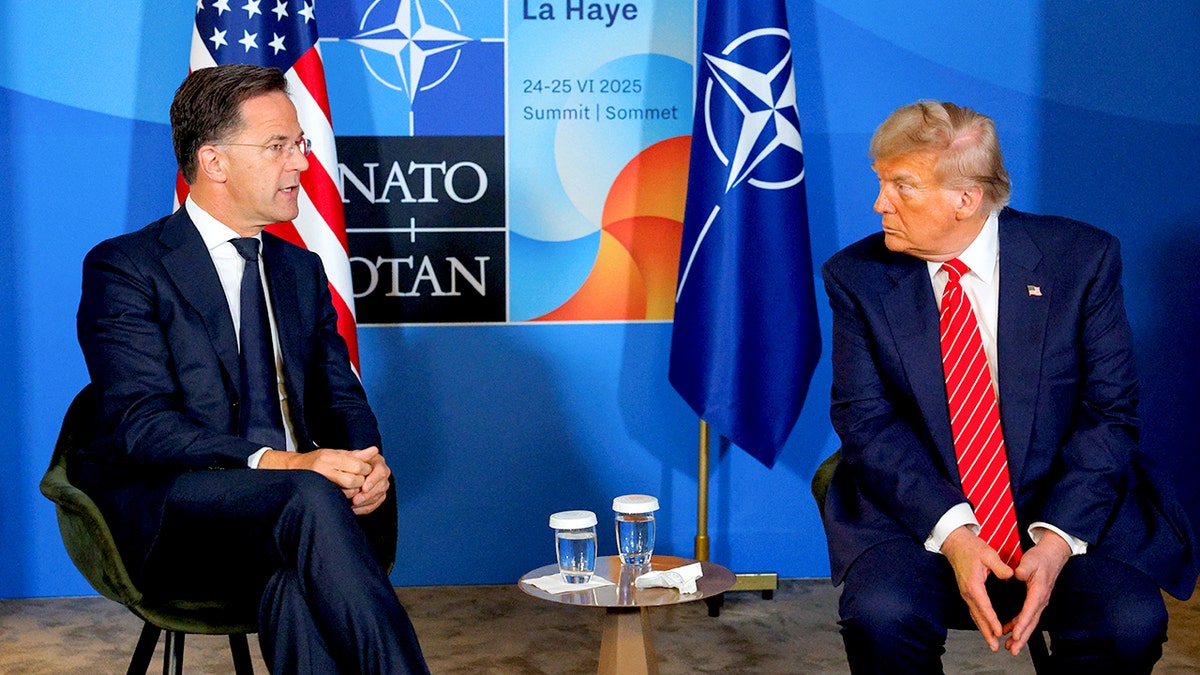
President Donald Trump meets with NATO Secretary General Mark Rutte at the NATO summit in The Hague, Netherlands, June 25, 2025. (Reuters/Brian Snyder)
TRUMP SAYS US WILL SEND PATRIOT MISSILES TO UKRAINE, ADDS THAT PUTIN ‘TALKS NICE AND THEN HE BOMBS EVERYBODY’
Though Trump had made clear from the campaign trail that he wanted to see Europe take a leading role in the war in Ukraine, last week he countered a major talking point from some within his party, including Vice President JD Vance.
Vance has argued against arming Ukraine and said in an op-ed last year, «[It] is not just a matter of dollars. Fundamentally, we lack the capacity to manufacture the amount of weapons Ukraine needs us to supply to win the war.»
Trump agreed to sell NATO nations top U.S. arms that will then be supplied to Ukraine.
«We want to defend our country. But, ultimately, having a strong Europe is a very good thing,» Trump said, sitting alongside NATO Secretary General Mark Rutte.
Security experts have largely argued that the future of Ukraine’s negotiating ability and, ultimately, the end of the war, will play out on the battlefield.
On Thursday, John Hardie, deputy director of FDD’s Russia Program, told U.S. lawmakers on the Helsinki Commission, also known as the Commission on Security and Cooperation in Europe, in a defense briefing that Ukraine needs to be supplied with long-range strike capabilities that can hit key Russian missile and drone plants.
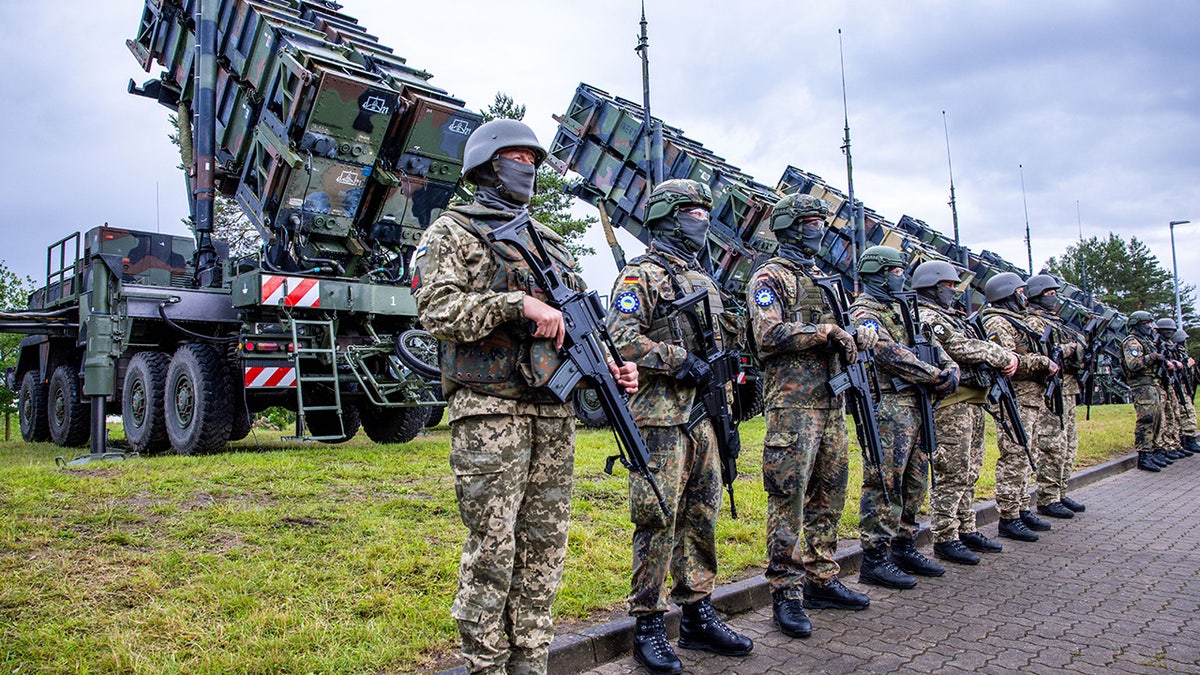
Ukrainian and German soldiers train on the Patriot air defense missile system at a military training area in Germany in June 2024. (Jens Büttner/picture alliance via Getty Images)
‘TRUMP HAS CHANGED THE GAME’: NATO ENTERS BRAVE NEW ERA UNDER PRESSURE FROM US, RUSSIA
«Ukraine shouldn’t be restricted merely to shooting down ‘arrows’,» Hardie said. «An optimal approach will combine both offense and defense. Ukraine needs to be able to hit the ‘archer’ and the factories that make the ‘arrows.’
«Putin will continue his unprovoked war so long as he believes it’s sustainable and offers a pathway to achieving his goals,» Hardie argued. «By shoring up Ukraine’s defense of its skies and enabling Ukraine to inflict growing costs on Russia’s war machine, as well as pressuring the Russian economy and exhausting Russia’s offensive potential on the ground, we may be able to change that calculus.»
But Fleitz, who serves as vice chair of the America First Policy Institute’s Center for American Security, said he believes this war will only be brought to an end when an armistice agreement is secured.
«I think there’s probably going to be an armistice where both sides will agree to suspend the fighting,» Fleitz said. «Someday, we will find a line where both nations will agree to stop fighting.»
Ultimately, he believes this will happen by Ukraine agreeing not to join NATO for a certain period of time, though with Moscow’s understanding that Kyiv will be heavily armed by Western allies.
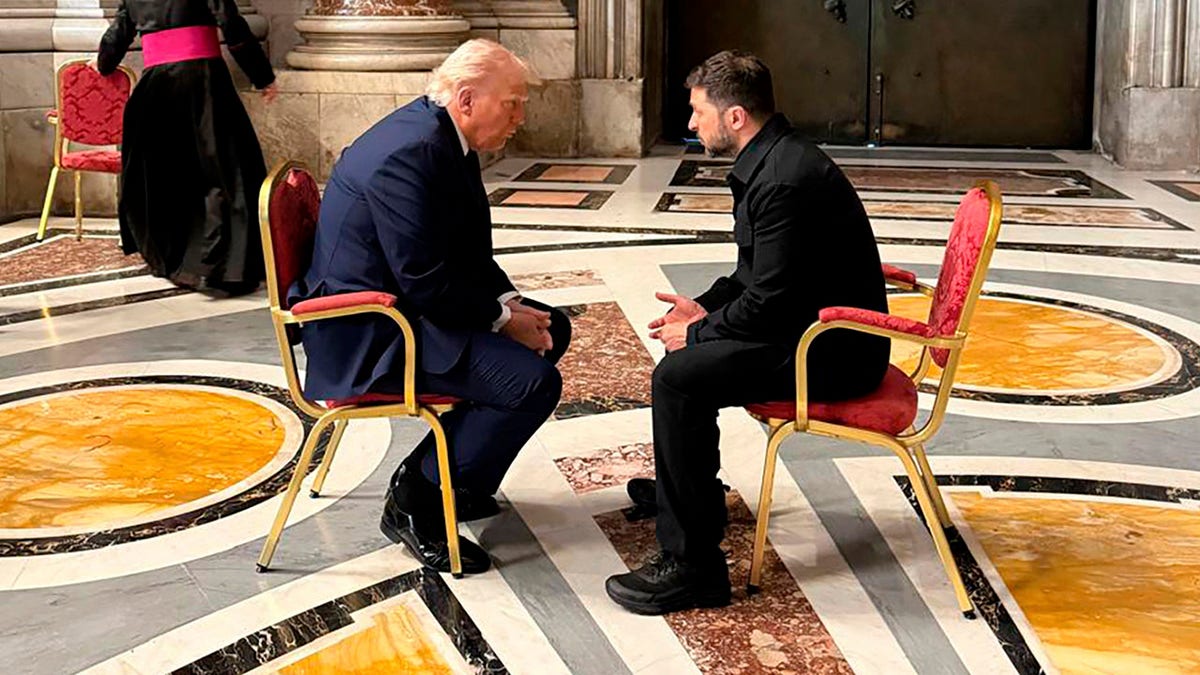
In this photo provided by the Ukrainian Presidential Press Office, Ukraine President Volodymyr Zelenskyy, right, and President Donald Trump, talk as they attend the funeral of Pope Francis in Vatican April 26, 2025. (Ukrainian Presidential Press Office via AP)
CLICK HERE TO GET THE FOX NEWS APP
«I think there’s a way to do this where Russia wouldn’t be concerned about growing Western European influence in Ukraine, and Ukraine would not be worried that Russia will invade once a ceasefire or armistice is declared,» he added. «Maybe this is a pipe dream, but I think that’s the most realistic way to stop the fighting.
«We know from history conflicts like this take time; peacemaking takes time,» Fleitz said. «I think that over time, Trump is going to have an effect on Putin.»
INTERNACIONAL
La drástica decisión de Israel en tres zonas de Gaza en medio de la crisis humanitaria

El ejército israelí anunció la suspensión de combates en tres zonas de Gaza en medio de la crisis humanitaria. Desde la fuerza comunicaron el inicio de una “pausa táctica” en los combates en tres áreas pobladas de Gaza durante diez horas al día.
Con esta medida se abrirían rutas seguras para la entrega de ayuda a los palestinos desesperados por la crisis, una serie de medidas para abordar un aumento del hambre en el territorio mientras que el gobierno de Benjamin Netanyahu enfrenta una ola de críticas internacionales por su conducta en la guerra de 21 meses.
Leé también: Emmanuel Macron anunció que Francia reconocerá a Palestina y provocó un fuerte rechazo de Israel
El ejército indicó que frenaría los combates en la Ciudad de Gaza, Deir al-Balah y Muwasi, tres áreas del territorio con grandes poblaciones, para “aumentar la escala de la ayuda humanitaria” que entra a la zona de conflicto. Desde la fuerza anunciaron además lanzamientos aéreos de asistencia en Gaza, que incluyen paquetes de ayuda con harina, azúcar y alimentos enlatados.
Los expertos en alimentos advierten desde hace meses sobre el riesgo de hambruna en Gaza, donde Israel restringió la ayuda con acusaciones a Hamas de desviar bienes para ayudar a fortalecer su gobierno, aunque sin presentar pruebas al respecto.
Las imágenes de Gaza de los últimos días de niños que padecen la crisis humanitaria aumentaron las críticas globales a Israel, incluso de aliados cercanos, que reclamaron por el fin de la guerra y la catástrofe humanitaria en la zona.
Israel aclaró que estas medidas se aplicarían al mismo tiempo que sigue su ofensiva contra Hamas en otras áreas. De hecho previo a “pausa táctica” funcionarios de salud en Gaza advirtieron que al menos 16 palestinos murieron en distintos ataques.
Por qué Israel anunció la suspensión de combates en tres zonas de Gaza en medio de la crisis humanitaria
- Previo al anuncio de suspensión de combates en tres zonas de Gaza en medio de la crisis humanitaria, Israel restringió la ayuda durante toda la guerra. La nueva medida se dispuso días después de que los esfuerzos de alto el fuego entre Israel y Hamás parecieran haber entrado en duda.
- De hecho el viernes Israel y Estados Unidos retiraron a sus equipos de negociación, con críticas a Hamas. El gobierno de Netanyahu dijo estaba considera “opciones alternativas” a las conversaciones de alto el fuego contra el grupo terrorista.
- Luego del fin del último alto el fuego en marzo Israel bloqueó completamente la entrada de alimentos, medicinas, combustible y otros suministros a Gaza durante dos meses y medio, con el argumento de presiones a Hamas para liberar a los rehenes.
- Bajo presión internacional, Israel alivió ligeramente el bloqueo en mayo. Desde entonces permitió la entrada de alrededor de 4500 camiones para que los distribuyan la Organización de las Naciones Unidas (ONU) y otros grupos de asistencia.
- Aunque el promedio de 69 camiones al día está muy por debajo de los 500 a 600 vehículos diarios que la ONU dice que se necesitan en Gaza.
- La ONU advirtió que no pudo distribuir gran parte de la ayuda porque multitudes hambrientas y bandas se llevaron la mayor parte de sus camiones al llegar.
- Como una forma de desviar la entrega de ayuda de la ONU Israel respaldó a la Fundación Humanitaria de Gaza, registrada en Estados Unidos y que en mayo abrió cuatro centros que distribuyen cajas de suministros alimentarios.
- Más de 1000 palestinos fueron asesinados por las fuerzas israelíes desde mayo cuando intentaban obtener alimentos, en especial cerca de esos nuevos sitios de ayuda, según la oficina de derechos humanos de la ONU.
- Israel criticó durante toda la guerra al organismo multilateral, al plantear que su sistema permitía a Hamas robar ayuda, aunque sin presentar evidencias.
- La ONU niega esas acusaciones y dice que su mecanismo de entrega era la mejor manera de llevar ayuda a los palestinos. El ejército dijo que las nuevas medidas se realizaron en coordinación con la el organismo multilateral y otros grupos humanitarios.
Israel, Franja de Gaza

 POLITICA3 días ago
POLITICA3 días agoLa justicia de Santa Cruz desafío a la Corte Suprema e incluyó a Cristina Kirchner en el padrón electoral

 POLITICA2 días ago
POLITICA2 días agoCristina Kirchner pidió salir a militar para que los que “están hambreando a la gente tengan su merecido en las urnas”

 POLITICA3 días ago
POLITICA3 días agoEl candidato libertario por el que Kicillof despidió a 24 policías denunció “una cacería de brujas” en la Provincia













